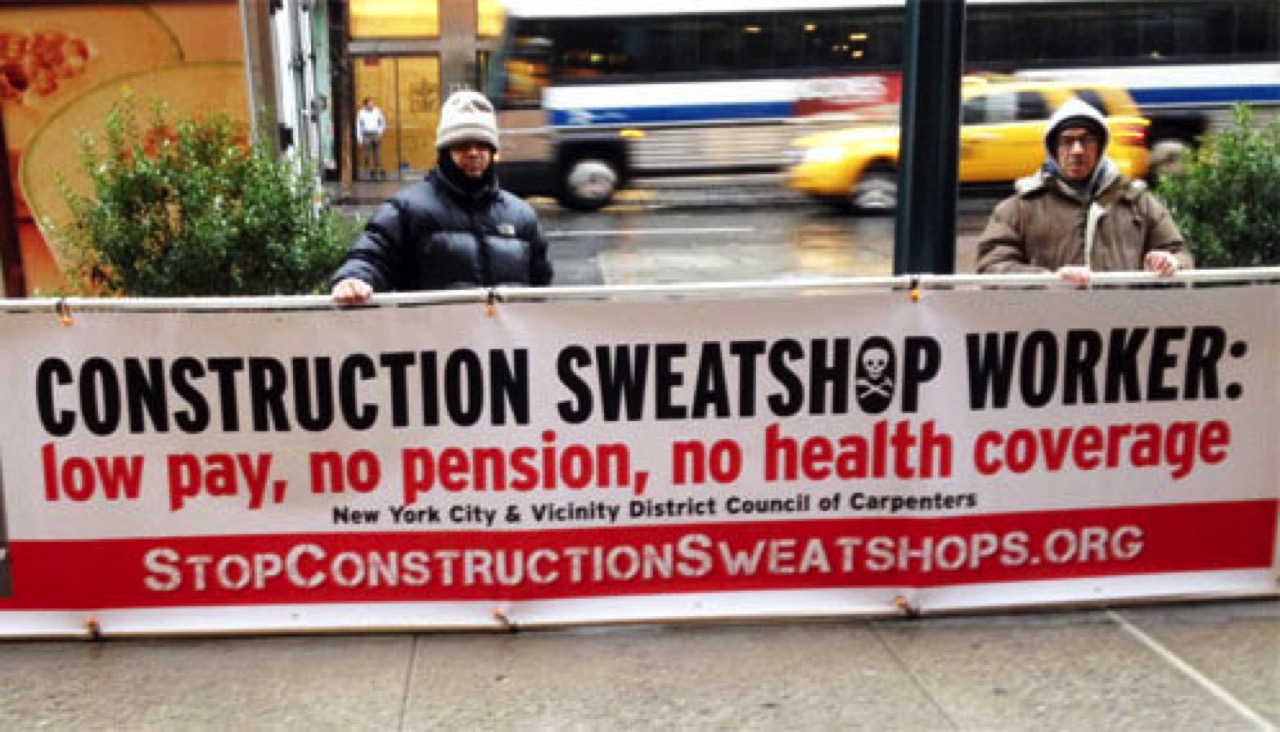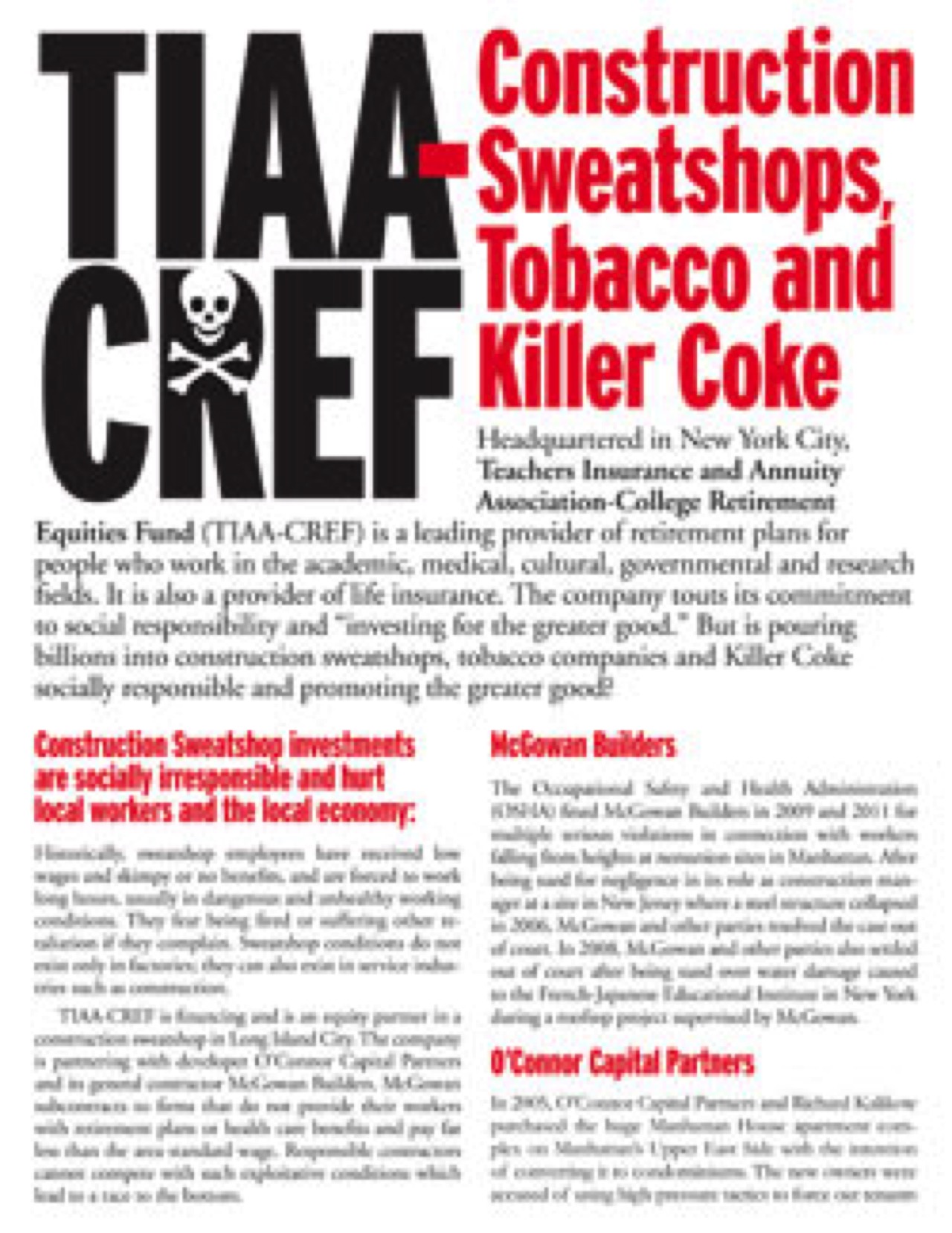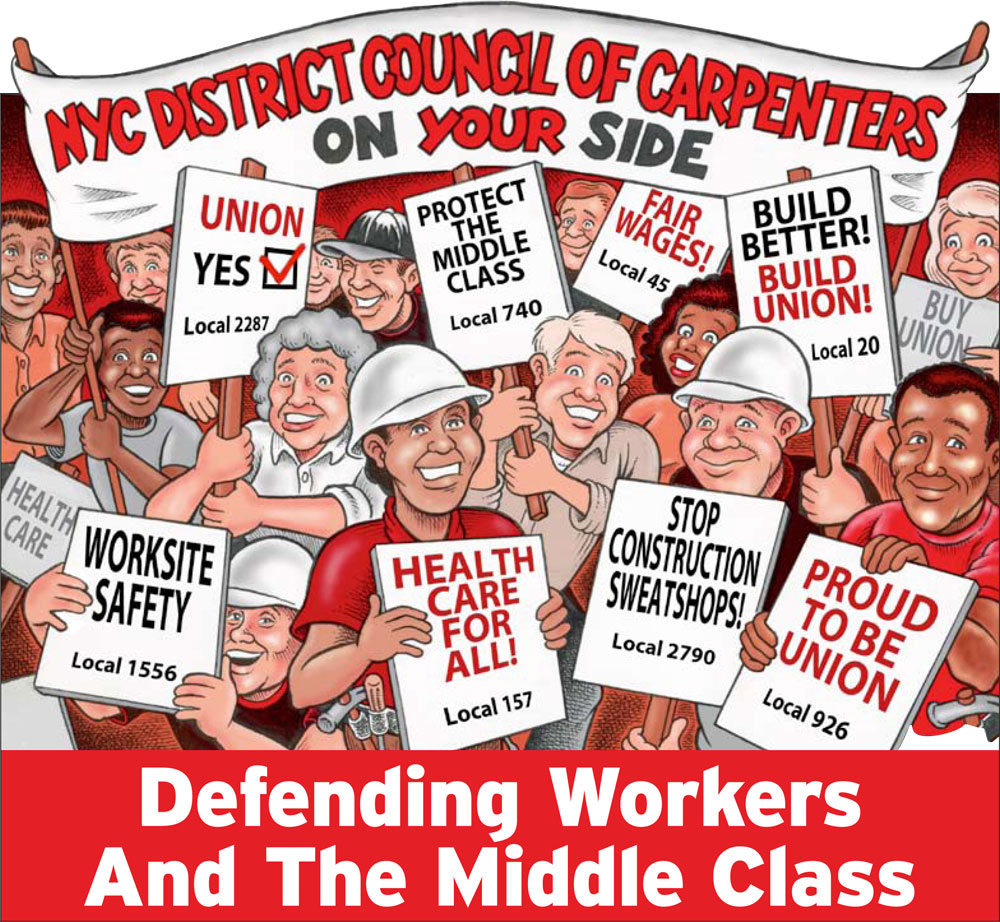Victory in 1st Campaign to Stop Construction Sweatshops
Corporate Campaign, Inc. created the Campaign to Stop Construction Sweatshops concept, the goal of which is to bring justice to workers in one of the most dangerous and exploitative industries in the country. The first Campaign to Stop Construction Sweatshops was on behalf of the 25,000-member NYC & Vicinity District Council of Carpenters over a building project in Queens, New York, in which TIAA-CREF was heavily invested. The developer and contractors partnering with TIAA-CREF were deemed guilty of operating a construction sweatshop in which workers were being paid substandard wages, received no health benefits and had no protections if they raised safety or other concerns on the job.
At first, efforts by the District Council of Carpenters to get the attention of TIAA-CREF about this injustice were completely ignored. However, once the Campaign kicked in and escalated, TIAA-CREF's attitude completely changed. This led to a disreputable subcontractor being removed from the project and TIAA-CREF completely disinvesting from the project. More importantly, TIAA-CREF decided to create a responsible contractor policy to avoid becoming the object of such a campaign again.

NYC District Council Members Protest TIAA-CREF Headquarters
Following is the language of that policy:
TEACHERS INSURANCE AND ANNUITY ASSOCIATION OF AMERICA — STATEMENT OF RESPONSIBLE CONTRACTOR POLICY REAL ESTATE INVESTMENTS
Teachers Insurance and Annuity Association of America ("TIAA") has a deep interest in the condition of workers employed by independent contractors engaged directly or indirectly by TIAA and/or its authorized representatives. TIAA has developed a comprehensive set of Policies and Procedures for its US investments which includes the requirements for a Responsible Contractor Policy ("Policy"). The Policy, described below, supports and encourages fair compensation, represented by wages and benefits, for workers employed by its independent contractors and subcontractors, subject to fiduciary principles concerning duties of loyalty and prudence, both of which further require competitive, risk-adjusted returns on TIAA's real estate investments. TIAA believes that an adequately compensated and trained worker delivers a higher quality product and service.
RESPONSIBLE CONTRACTOR
A Responsible Contractor, as used in this Policy, is a contractor or subcontractor which adequately compensates its workers with a fair wage and a fair benefit, as evidenced by payroll and employee records. "Fair benefits" are defined as including, but are not limited to, employer-paid family health care coverage and retirement benefits. What constitutes a "fair wage" and "fair benefit" depends on the wages and benefits paid on comparable real estate projects, based upon local market factors, that include the nature of the project (e.g., residential or commercial; public or private), comparable job or trade classifications, and the scope and complexity of services provided.
MINIMUM POLICY REQUIREMENTS
- Duty of Loyalty to Participants: Notwithstanding any other considerations, assets shall be managed for the exclusive benefit of TIAA participants. TIAA's, as well as its authorized representatives', duty to the participants and their beneficiaries shall take precedence over any other duty.
- Duty of Prudence: TIAA management, staff, and authorized representatives are charged with the fiduciary duty to exercise the care, skill, prudence, and diligence appropriate to the task.
- Competitive Return: To comply with the duties of loyalty and prudence, all investments and services made must be made and managed in a manner that produces a competitive risk-adjusted return.
- Competitive Bidding: Independent Contractors and their subcontractors shall be selected through an approved selection process, including competitive bidding. Factors to be considered include: experience, reputation for honesty, integrity, timeliness, dependability, fees, safety record and adherence to this Policy.
- Applicable Law: All Independent Contractors and their subcontractors shall observe all local, state, and national laws.
Practice and Administration
- Application: This Policy shall apply to all applicable Independent Contractors and their subcontractors engaged on behalf of TIAA's Global Real Estate unit. The Policy shall not apply to investments such as hybrid debt, joint ventures, opportunity funds and other real estate investments where TIAA does not have a 100% ownership stake and/or full control of the investment. However, in those instances in which TIAA does not have a 100% ownership stake or full control of the investment, TIAA will make reasonable attempts to encourage partners to comply with the spirit and practice of this Policy.
- Notification: Each prospective Independent Contractor shall be advised of this Policy, and its requirements, as a necessary condition for the engagement of its services.
- Solicitation: All requests for proposal and invitations to bid covered by this Policy shall include the terms of this Policy. Responses by bidders shall include information to assist TIAA in evaluating a bid.
- Contracts and Renewals: All contracts entered into after the effective date of this Policy and pertaining to applicable real estate investments, including renewals of such contracts, shall include the terms of this Policy.
- Responsibilities: The responsibilities of the parties to this Policy are defined as below:
- TIAA: TIAA shall: i. Review the authorized representatives' annual certification statement regarding compliance with this Policy. ii. In those instances where TIAA does not have a 100% ownership stake or full control of the investment, make reasonable attempts to encourage partners to comply with the spirit and practice of this Policy.
- Authorized Representatives: Authorized Representatives shall:
- Communicate the Policy to prospective independent contractors.
- Adopt and document procedures to comply with this Policy.
- Annually certify to TIAA compliance with this Policy and if requested provide written substantiation of compliance.
- Independent Contractors: Independent Contractors shall:
- Communicate in bid documents the Policy to sub-contractors seeking to secure construction or building service contracts.
- Certify and maintain documentation for successful bidders and if requested provide written substantiation of actions to comply with this Policy.
- Wages and Benefits: This Policy avoids a narrow definition of "fair wage," "fair benefits," that may not be practical or comparable in all markets. This Policy does not require a "prevailing wage," as defined by government surveys (e.g. State Departments of Labor or their equivalents). This Policy looks to local practices and recognizes that labor market conditions vary across the country and that flexibility in its implementation is very important. Items that may be considered in determining "fair wages" and "fair benefits" include: local wage practices, state laws, mandated prevailing wages, and labor market conditions. As the duties of loyalty, prudence and competitive return are paramount, this Policy requires obtaining competitive pricing, including through an indicated bidding process.
- Enforcement: TIAA shall utilize a multi-prong integrated audit process using a self-certification process to determine compliance with this Policy.
- Annual property management attestation certifying compliance with this Policy which will include: (a) names of bidders, (b) actual bid packages, (c) requests for proposal documents, and (d) written rationale of selection if requested.
- Attestations from general contractors in the case of development or redevelopment and major capital improvement projects.
- Periodic reviews by TIAA or third-party compliance vendors. Failure to comply with the requirements of this Policy may be grounds for termination or failure to renew.
NEUTRALITY
TIAA recognizes the rights of employees to determine whether to seek representation, and supports and encourages a position of neutrality, in the event there is a lawful attempt by a labor organization to organize workers employed in the construction, maintenance, operation, and services at a TIAA-owned property.


